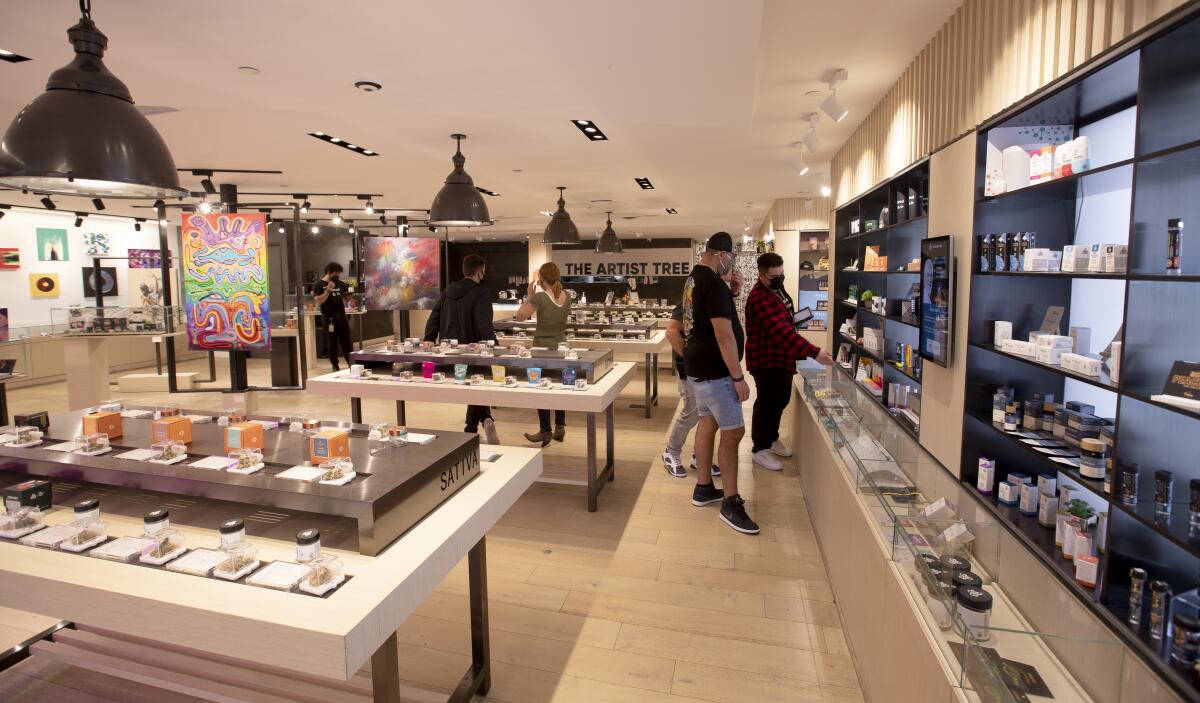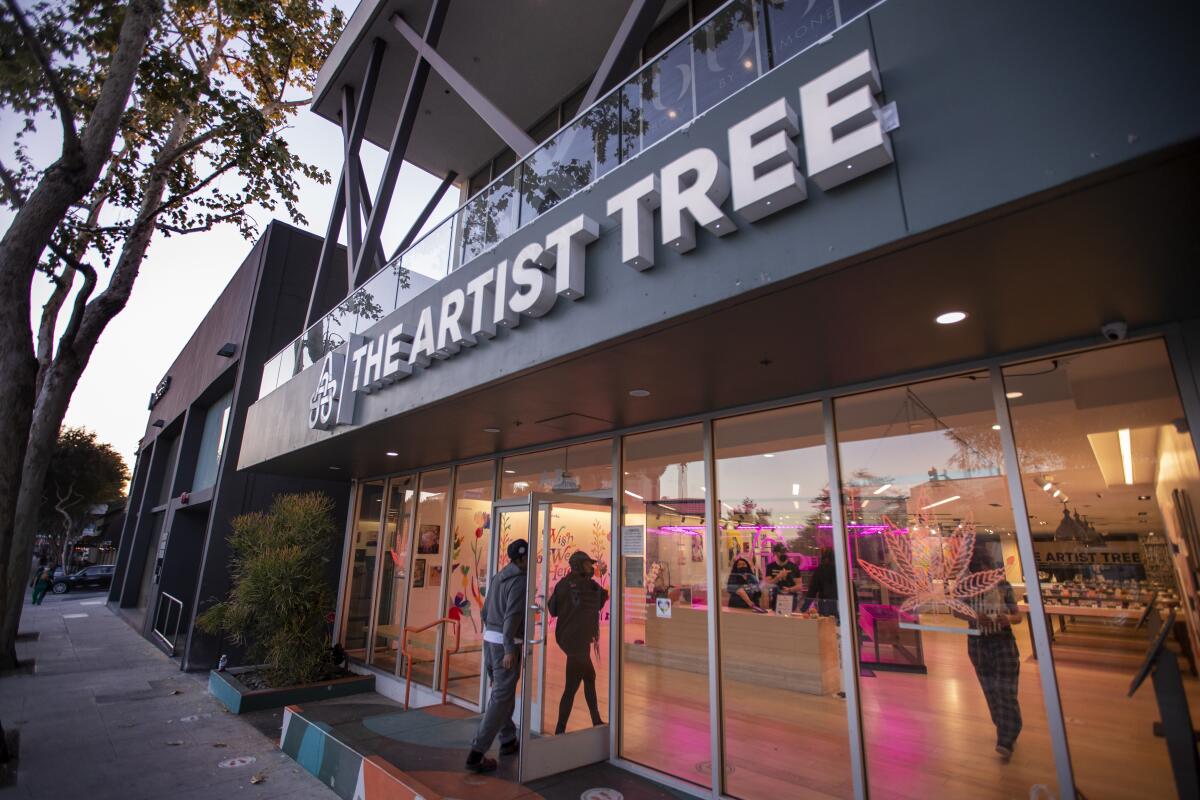California considers legalizing cannabis cafes to help struggling marijuana industry

- Share via
You order a sandwich, a coffee and a marijuana cigarette, then settle in for a musical performance. This could become the future under a bill aimed at changing the landscape of cannabis use in California.
The legislation put forward this month by Assemblyman Matt Haney (D-San Francisco) would legalize the sale of food and nonalcoholic beverages at cannabis retailers and lounges.
“It’s not unlike a neighborhood bar or cafe where people gather and get a lot of social value [out] of that,” Haney said. “We’re allowing in many places on-site consumption of cannabis, but they’re pretty sad places right now because you can’t eat or drink.”
Alcohol would not be allowed at the “cannabis cafes” under Assembly Bill 374, Haney noted.
If passed, the bill and its counterpart introduced in the state Senate would allow localities and cities to permit the consumption of food and drink at cannabis retailers. The state would not force the new regulations on municipalities, Haney said.
Haney’s bill would also allow cannabis cafes to host live performances and sell tickets to the events.
Haney said he has spoken with marijuana retailers from Los Angeles to the Coachella Valley, all of whom say their businesses must expand to survive.
“If we want this legal industry to survive in California, we have to change these laws. They’re losing to the illegal cannabis industry, and one thing that the legal cannabis small business can offer is an experience,” Haney said. “Cannabis businesses told us that they may have to close their doors unless the laws change. The regulations that prohibit them from offering other products like food are a huge burden.”
In West Hollywood, cannabis cafes are using workarounds to serve food and drinks. At the Artist Tree Dispensary & Weed Delivery on Santa Monica Boulevard, weed smokers can hang out at the second-floor lounge as if dining at a restaurant. People can order food from Fresh Corn Grill, a restaurant that has a deal with the Artist Tree.

“So we have plated food available. We’re mimicking the experience of being in a restaurant though we are not the actual ones selling the food,” said Lauren Fontein, a co-owner of the Artist Tree. “We just kind of have to jerry-rig the process to get there.”
Although the experience is great for the customers, Fontein said, the proceeds go to the restaurant, not her business.
“That’s the big problem, which is why this bill is very important. The food and beverages is a big part of the revenue scheme and we’re not able to take advantage of that now,” she said.
Fontein said that the Artist Tree has struggled to maintain profitability in its lounge, which has high overhead costs including staffing and build-out.
“The whole lounge model in general hasn’t been proven successful by any company,” she said.
In the city of Los Angeles, where lounges are not licensed, retailers are even less lucky.
“I’ve had a location next door to my dispensary for four years waiting for consumption lounges to be legal in Los Angeles,” said Jerrod Kiloh, who has owned a dispensary called the Higher Path in Sherman Oaks for 10 years.
Kiloh said the ability to sell drinks, food and an experience for customers would help attract people away from the illicit marijuana market.
“You do want coffee, food, snacks.... Those other services or experiential side of things are super important for this business to grow beyond being a commodity,” Kiloh said. “There’s a reason people go to a bar and it’s not because they want to spend four times more on alcohol than they would at a grocery store.”
Even if the state allows lounges to operate more like restaurants or cafes, that’s just one small piece of the puzzle for the legal weed industry.
Robert Solomon, co-chair of the UC Irvine Center for the Study of Cannabis, said that heavy taxation remains the biggest challenge for people operating legal cannabis shops. The state levy on marijuana retail sales is 15%.
The ability of lounges to sell food and nonalcoholic beverages is a “minor” change, Solomon said.
But the change could contribute to the normalization and destigmatization of marijuana use, said West Hollywood Councilwoman Chelsea Byers, who supports the bill.
“Offering food and entertainment like this might make an opening for people who are otherwise closed off to use of cannabis,” she said.
Byers, a cannabis user, said the bill could transform retailers from antiseptic, pharmacy-like locations into community spaces.
“It helps fulfill the vision of making these third spaces for people, where you go in between home and work,” she said.
Haney compared the possibilities to Amsterdam, the Dutch city where marijuana is decriminalized and available at coffee shops, which has been a major tourism boon. Haney noted that his bill would not allow existing coffee shops to sell marijuana, but licensed marijuana retailers to sell coffee.
A spokeswoman for the Los Angeles Department of Cannabis Regulation said it is “monitoring” the bill but did not comment on whether the city would opt in if it passed.
More to Read
Sign up for Essential California
The most important California stories and recommendations in your inbox every morning.
You may occasionally receive promotional content from the Los Angeles Times.











